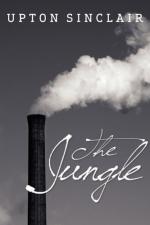|
|
The Jungle Chapter 31
After getting a job, Jurgis tells Marija she can leave the whorehouse now that he is making enough money for the whole family. She tells him she can't leave, that she is addicted to dope and is unemployable. Elzbieta is now ill and the boys are unruly after their years on the streets selling papers. One night, a day before the election, a friend of the hotel, named Fisher, asks to see Jurgis. Fisher is a millionaire, dedicated to settlement work and lives in the slums of Chicago. He is not a Socialist but is sympathetic to the cause. That night, he means to host a get together at which the editor of a big East Coast magazine, who writes against Socialism, will be present. Fisher wants Jurgis to tell this editor about the "pure food" he saw processed at the packinghouses. In addition to Fisher and the editor, named Maynard, Harry Adams is there along with some other Socialists, including a young college woman. Mr. Lucas is a mild-mannered cleric and itinerant evangelist. Nicholas Schliemann is a tall, bearded Swede who was a professor of Philosophy before coming to America. He is a Socialist who fully believes in the proletariat revolution and Jurgis is drawn to him immediately. He has an opinion on everything and the discussion moves from religion, to philosophy to politics, and ultimately, to Socialism. During the discussion, Mr. Lucas and Nicholas Schliemann agree on nothing even though they are of the same party. Maynard, the editor, points this out and Schliemann speaks at length about Socialism's breadth of ideas. The Socialist, he says, believes in the common ownership and democratic management of the means of producing the necessities of life. He also believes the way to do this is the class-conscious political organization of the workers, the wage earners. Schliemann and Lucas agree on this much but not more. Lucas is a religious Socialist, seeing a religious end as the result of Socialist means. Schliemann assumes a free-association end-anything is possible and it will be better. He goes on about the wastes of competition (capitalism) and what they breed: vice, industrial warfare, graft, overly wealthy people, and so on. He stresses the importance of intellectual production over capitalistic production, as well as "the positive economies of cooperation" and possible Utopian societies. But most of all, he decries the trials of wage-slavery. This last section of the Jungle is generally agreed to be Sinclair's polemic for Socialism, voiced through Nicholas Schliemann. "In a society dominated by the fact of commercial competition, money is necessarily the test of prowess, and wastefulness the sole criterion of power." Chapter 31, pg. 403
Jurgis is again blissful and revitalized. Things are so clear-not only the injustice, but also the way to overcome it. On Election Day, the Socialist party takes 400,000 votes, which is an enormous increase...350% over four years. The Socialist party takes votes all over the country.
In fact, in Illinois alone, two men are elected to the state legislature.
The Jungle ends with a plea to organize against the evils of capitalism and that, by that means, "Chicago will be ours." "And we shall organize them for the victory! We shall bear down the opposition, we shall sweep it before us-and Chicago will be ours! Chicago will be ours! CHICAGO WILL BE OURS!" Chapter 31, pg. 413



